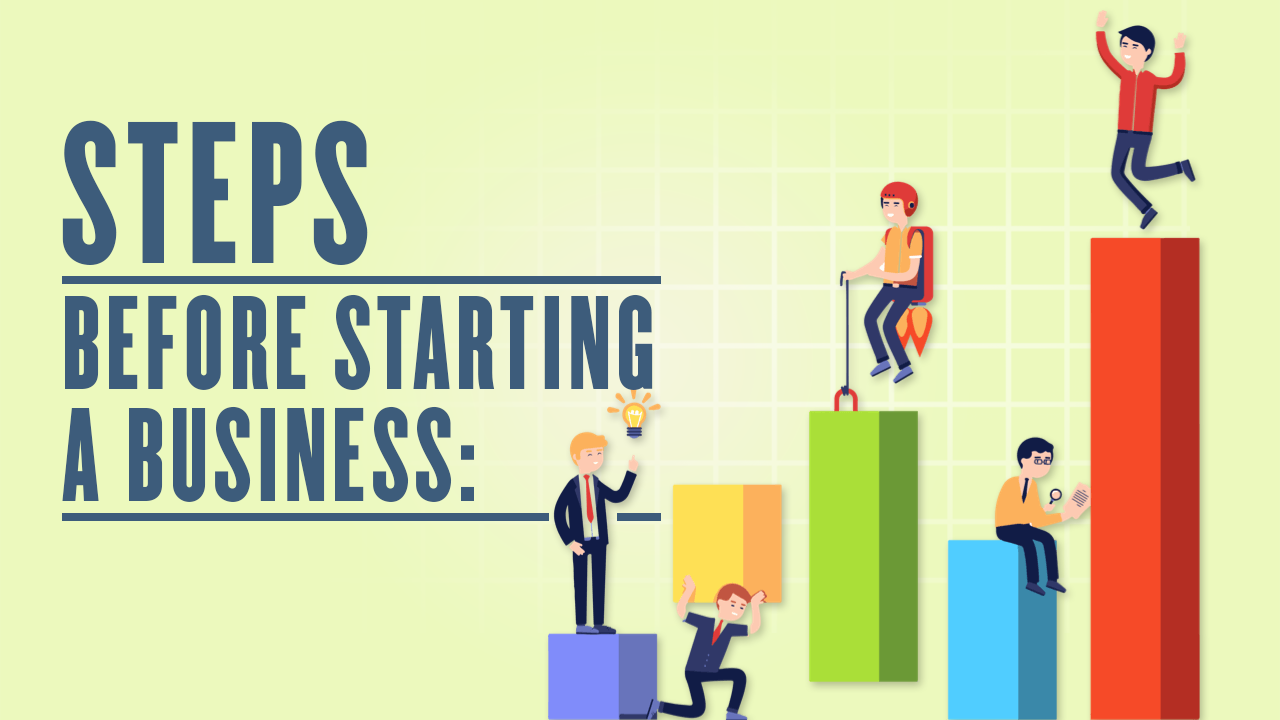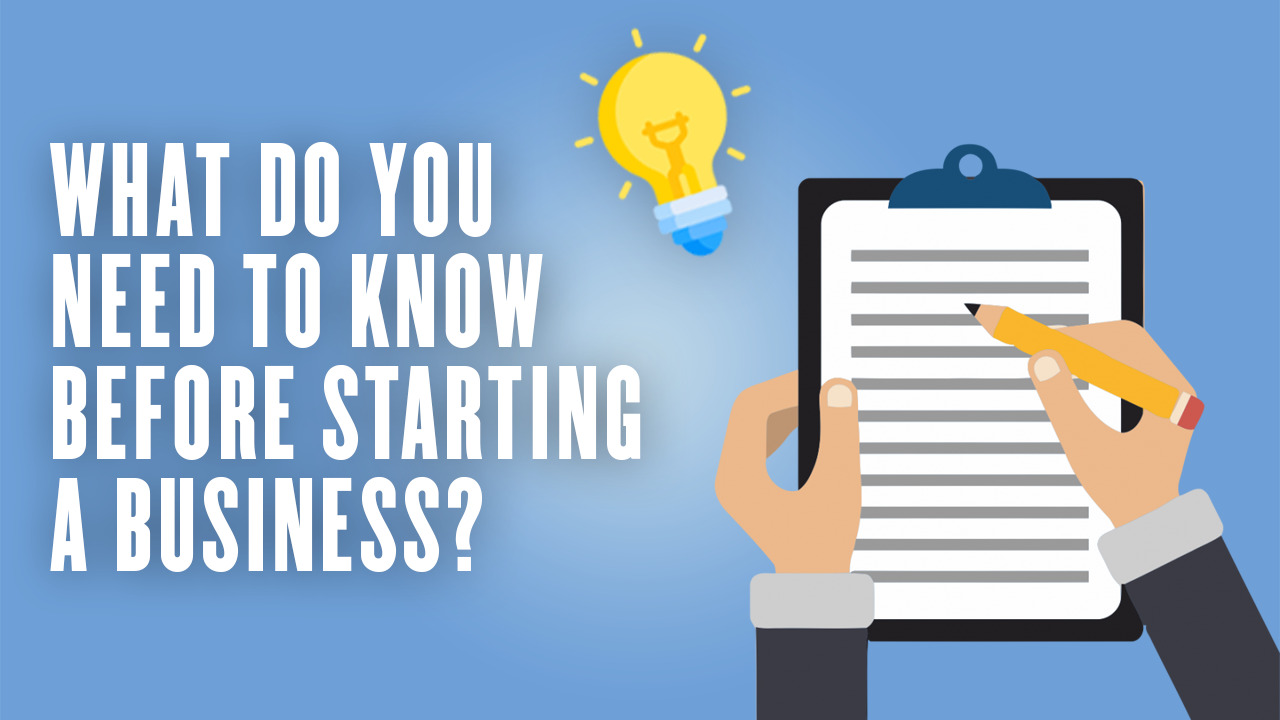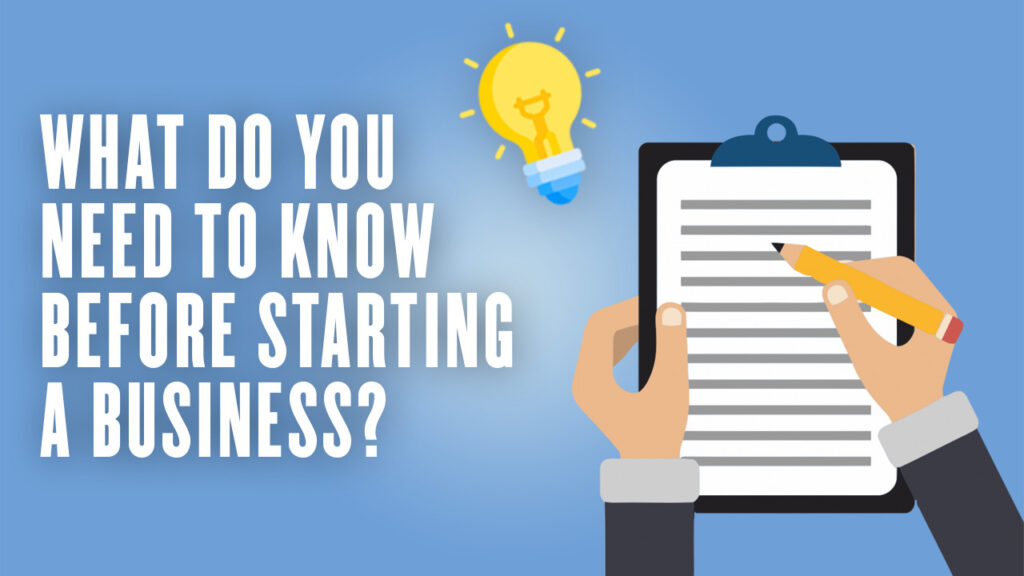Planning, making important financial decisions, and completing a number of legal tasks are all part of the process of starting a business. To discover more about each phase, scroll down. Here’s what you need to know about how to start a business.
What do you need to know before starting a business?
Starting a business is a wonderful and rewarding experience, but there are a few things to be aware of that no one told me to be aware of. This isn’t meant to discourage all prospective entrepreneurs, but it’s meant to help you get ready for the business world.
-
It takes a LOT of work more than you realize
It will take more time, work, blood, sweat, and tears than you can imagine right now to become successful (not just in business, but also in sports, life, love, and so on). Long days, long nights, long weeks, and long weekends to realize a desire and live a happy life.
-
Your product isn’t for everybody, and not everyone is your customer
At first, I assumed that everyone would be a perfect fit for what I had to offer. I didn’t realize I wasn’t meant to help everyone until I took the time to figure out who my ideal client, or “customer avatar,” was. A unique person with a specific need is your target market, not “everyone.”
If you’re going to try to persuade someone that you’re worth paying attention to, look for those who are already aware of your existence.
-
You may have to leave some people behind
With your foot on first, you can’t steal second, and sometimes it’s our friends who hold down our shoe. It’s okay if not everyone is supposed to accompany you on this journey. The rest will drift away if you remain with your actual buddies. You may have to cut the cords and leave them behind if they don’t.
Steps Before Starting A Business:

1. Go through the process of self-assessment
As exciting as starting a new business may sound, there are a few things to think about before you go for it. Before getting started, it’s critical to do a complete self-assessment procedure. You’ll have to think about your abilities, knowledge, and any potential roadblocks.
Ask yourself the following questions:
- What are your most significant strengths and shortcomings, and how do you deal with them?
- What are some of your favorite pastimes?
- Taking chances is something you enjoy doing.
- What are your present financial circumstances?
- What impact would launching a business have on your personal life?
When you’re thinking about these challenging questions, be open and honest with yourself. After that, you can move on to finding the ideal business for you to work for.
2. Look for a business idea
Now it’s time to start looking for business ideas. Take notes on each of the following topics as you begin to plan:
Business Structure: Consider the different types of businesses that are accessible and which ones appeal to you. Do you want to start your own business? Is it more likely that you want to establish a home-based business?
Past experience: The best instructor, according to some, is previous experience. What previous work experience do you have that you can share? Include both hard and soft talents such as leadership, communication, and the ability to work with others, as well as job-specific abilities such as finance or marketing.
Interest: During the self-evaluation process, you should have identified your interests.
Using social media: such as Twitter and Instagram, can lead to a variety of business ideas. Learn how you can help with the proper product or service by looking into what people are talking about on the internet.
3. Find and hire good employees
It’s crucial to surround yourself with the right people if you want to succeed in business. Not only will hiring unqualified people cost you time and money, but it will also harm your company’s brand.
We understand how difficult it can be to find top talent, which is why if you decide to start a Main Street business, we’ll help you navigate the process of hiring subcontractors. Here are some tips to assist you hire the appropriate manner for any business.
Make your job description as detailed as possible: Take the time to compose a detailed job description. Include any responsibilities you may have, especially in bullet points so a reader can skim, as well as any advantages you may have.
During the interview, ask the correct questions: Sort prospects depending on their responses to your questions. What prompted them to apply for this position, for example? Do they have a favorite career project?
Make use of social media: LinkedIn is a wonderful place to look for potential applicants. On their profile, look at their employment history as well as any certifications or educations they may have. By looking at the posts they’ve liked or shared, you can frequently get a sense of the person’s personality.
Learn management skills: In order to build a high-quality team, you must first become a good leader yourself. A good manager understands how to give each employee the tools they need to achieve their full potential.
4. Make Your Business Legal
You want to make sure your company is correctly set up when you first start it up. Failure to do so could result in hefty fines from the government or a hefty personal liability.
Prepare to fill out a lot of paperwork. Here’s a rundown of what you’ll need to do to get your business up and running legally.
Business name: If your business name isn’t protected by someone else’s copyright, make sure it’s legally available.
Register your business: You must register your company as a sole proprietorship, LLC, or corporation in order to establish a legal business entity.
Get the essential licenses and permits: In order to operate your business, you may be required to obtain certain business licenses or permits in certain states. If you don’t have a federal or state tax ID, you’ll have to pay taxes on it.
Get your federal and tax ID: You’ll have to file a tax return if you make money. For the IRS to be able to recognize your company, make sure you have a federal and tax ID number.
What do you need to prepare before starting your own business?

1. Take a deep dive researching the market and concentrate on the customer.
Companies that don’t have the best product or service or aren’t the first to market but are incredibly successful. They’ve mastered online marketing and sales may be found all over the place.
In order to transform your idea into a profitable business, you must conduct market research. It’s a technique to find out who your potential clients are and what businesses are currently in your neighborhood. Using this knowledge, you may create a competitive advantage for your company.
- Investigate the demographics of your potential customers to learn more about their purchasing habits.
- Keep an eye on your competition, chat to others in related industries, look at their websites. See what their consumers are saying about them on social media.
2. Identify your skills
The industry knowledge and willingness to take risks are two factors that contribute to a successful business owner’s success. Having a clear understanding of your strengths and shortcomings will assist you in doing your business in a planned manner. An entrepreneur’s desired talents can be categorized into the following:
- Personality Characteristic: As a business leader, you should exude positive qualities such as optimism, drive to succeed, risk-aversion, and resilience.
- Interpersonal Skills: Even if you’re running your own firm, you’ll need to develop strong professional relationships with dealers, suppliers, customers, and investors.
- Practical Skills: Being a successful entrepreneur necessitates a constant state of high performance. You may take your business to new heights with practical skills like goal-setting, decision-making, and business understanding.
3. Have a financial plan
You must have a full awareness of your existing financial situation as well as the amount of money you intend to invest before starting a firm. The benefit of starting a business in your own house is that you can save money on the initial costs.
Create a Cash Flow Statement: On a monthly basis, a cash flow statement is used to compute the cash balance by combining total costs, total sales, and collections. After deducting the expenses, the cash balance can provide you with information about your cash requirements and working capital.
4. You must have stamina. Persistence is KEY
To make your business succeed, you’ll have to work harder than you’ve ever done before. If you’re dealing with a chronic sickness, serious family troubles, or simply don’t want to put in the effort, don’t try to start a business. Before you start, make sure you’re in it for the long haul and have the energy to put in the necessary effort.
Yes, you’ll have to do things that make you feel uneasy (like sales and marketing). If you accomplish these things, though, you may be able to make millions of dollars in a matter of two to five years. The time and effort you put into getting your business off to a good start will be well worth it.
5. Understand the risks
When it comes to starting a new business, there will always be some risk involved. Before you start working on your business, you must first calculate, evaluate, and plan for risk. Before developing a business plan, you must first examine the risks associated with your industry.
6. Get a mentor
No matter how tempting it may sound, starting a business should not be a solo venture. Finding people who have been on this path before will help you get started on the right foot. Meet other experts in your field, attend industry-specific training and events, and hear from industry thought leaders about their strategies. You might also want to consider hiring a coach who can provide you specific advise.
Learn directly from someone who has already gone through the process and can assist you in setting up your new business for success.
KEY TAKEAWAY:
The success of a business depends on the level of preparedness maintained during the setup of the company. The tips mentioned above can help you sail through the initial turbulence that you may experience before establishing a home-based business.
MORE blogs here:
23 Simple Business Ideas You Can Start With Today
Why You Should Fail FASTER In Business
Why You Must Be Persistent In Business To Succeed


